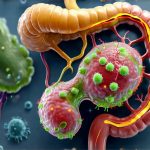The intricate world within our digestive system – often referred to as the gut – is gaining increasing recognition for its profound impact on overall health. For years, it was largely overlooked, but scientific research now reveals a bidirectional relationship between gut health and everything from immunity and mental wellbeing to chronic disease risk and nutrient absorption. This complex ecosystem, comprised of trillions of microorganisms (the gut microbiota), plays a vital role in countless bodily functions. Many individuals immediately turn to supplements – probiotics, prebiotics, digestive enzymes – believing they’re the quickest path to a healthier gut. However, it’s entirely possible—and often preferable—to significantly improve gut health without relying on pills or powders.
The focus on supplementation can sometimes overshadow the foundational elements of gut health: diet and lifestyle. While supplements can be useful in specific circumstances, they are rarely a substitute for consistent healthy habits. A holistic approach that prioritizes nourishing your existing gut microbiota through natural means is often more effective long-term and fosters a sustainable relationship with your digestive system. This article will explore the many ways you can cultivate a thriving gut environment naturally, focusing on dietary strategies and lifestyle adjustments that support optimal digestion and microbial balance, without necessarily needing to reach for supplements. How to maintain gut health under stress is also key to consider.
Dietary Foundations of Gut Health
The food we eat is arguably the most significant factor influencing our gut microbiota composition. A diet rich in diverse plant-based foods provides the fuel – fiber specifically – that beneficial bacteria thrive on. Conversely, a diet high in processed foods, sugar, and saturated fats can disrupt this balance, promoting the growth of less desirable microbes. It’s not about eliminating entire food groups (unless medically necessary); it’s about prioritizing nutrient-dense options and cultivating mindful eating habits. Think of your gut as a garden: you need to “feed” the good bacteria so they can flourish.
Consider incorporating more fermented foods into your diet – things like yogurt (with live cultures), kefir, sauerkraut, kimchi, kombucha, and miso. These foods naturally contain probiotics, which are live microorganisms that can contribute to a diverse gut microbiome. However, remember that the probiotic strains found in fermented foods differ from those in supplements, and their survival rate through digestion can vary. The benefit lies not just in the bacteria themselves, but also the byproducts of fermentation – short-chain fatty acids (SCFAs) – which have numerous health benefits. Can gut healing reverse food sensitivities is a related topic to explore for those with dietary concerns.
Beyond fermented foods, emphasizing whole, unprocessed foods is paramount. This means choosing whole grains over refined grains, fruits and vegetables over sugary snacks, and lean proteins over processed meats. Increasing your fiber intake gradually is crucial to avoid digestive discomfort; suddenly increasing fiber can lead to bloating and gas. Aim for a variety of plant-based sources – different colors and types of fruits and vegetables provide diverse nutrients that support a broader range of beneficial bacteria. Hydration also plays a key role, as water aids in digestion and helps move waste through the system effectively. Can sugar-free foods be more harmful is an important consideration when choosing alternatives to sugary snacks.
The Role of Fiber
Fiber isn’t just “roughage”; it’s the primary food source for your gut microbes. Different types of fiber feed different bacterial populations, contributing to microbial diversity. Prebiotics, a type of fiber that specifically promotes the growth of beneficial bacteria, are found in foods like onions, garlic, leeks, asparagus, bananas, oats, and apples. When these prebiotics reach the colon, they’re fermented by gut bacteria, producing SCFAs – butyrate, acetate, and propionate – which have anti-inflammatory properties and support gut barrier integrity.
A healthy gut barrier is essential for preventing “leaky gut,” a condition where undigested food particles and toxins can pass through the intestinal lining into the bloodstream, potentially triggering immune responses. Adequate fiber intake helps strengthen this barrier by providing fuel for cells in the colon wall. It’s also important to remember that not all fiber is created equal. Soluble fiber (found in oats, beans, apples) absorbs water, forming a gel-like substance that slows digestion and can help regulate blood sugar levels. Insoluble fiber (found in whole grains, vegetables) adds bulk to stool, promoting regularity.
To increase your fiber intake:
1. Start slowly, adding small amounts of fiber-rich foods to each meal.
2. Choose whole grain options over refined grains whenever possible.
3. Include a variety of fruits and vegetables in your diet daily.
4. Drink plenty of water to help move fiber through the digestive system.
Minimizing Gut Disruptors
Just as important as adding beneficial foods is minimizing those that can negatively impact gut health. Processed foods, laden with sugar, unhealthy fats, and artificial additives, can disrupt the delicate balance of your microbiome. Sugar feeds harmful bacteria, leading to inflammation and potentially contributing to conditions like irritable bowel syndrome (IBS). Artificial sweeteners, while seemingly a healthier alternative, have also been shown to alter gut microbial composition in unfavorable ways.
Similarly, excessive alcohol consumption and chronic stress can take a toll on the gut. Alcohol disrupts the gut barrier, increasing permeability, while stress triggers the release of cortisol, which can negatively impact digestion and microbial balance. Reducing these stressors is crucial for maintaining a healthy gut environment. Antibiotics, while sometimes necessary, also indiscriminately kill both beneficial and harmful bacteria, leading to dysbiosis (an imbalance in the gut microbiome). If you must take antibiotics, consider incorporating fermented foods into your diet afterward to help repopulate the gut with beneficial microbes – though this shouldn’t replace medical advice regarding antibiotic use. Can gut sensitivities cause panic attacks demonstrates how deeply interconnected gut health and overall wellbeing are.
The Importance of Mindful Eating
The way we eat can be just as important as what we eat. Mindful eating involves paying attention to your body’s hunger and fullness cues, savoring each bite, and avoiding distractions during meals. This allows for optimal digestion and reduces the risk of overeating, which can strain the digestive system. Eating quickly often leads to inadequate chewing, making it harder for the gut to break down food properly.
Stressful mealtimes can also negatively impact digestion. When you’re stressed, your body shifts into “fight or flight” mode, diverting blood flow away from the digestive system and impairing its function. Taking a few deep breaths before meals and creating a calm eating environment can help promote relaxation and improve digestion. Chewing food thoroughly not only aids in mechanical breakdown but also stimulates saliva production, which contains enzymes that begin the digestive process. Why store-bought broths can be a problem highlights how seemingly healthy options could still impact your gut. Also consider Can cold weather trigger gut sensitivity as seasonal changes can affect digestion.
The information provided here is intended for general knowledge and informational purposes only, and does not constitute medical advice. It is essential to consult with a qualified healthcare professional for any health concerns or before making any decisions related to your health or treatment.


















